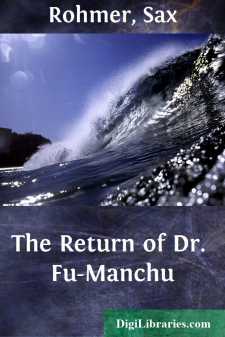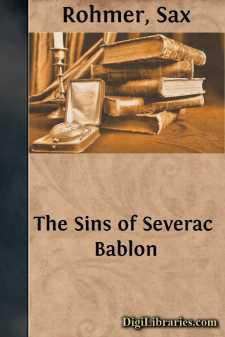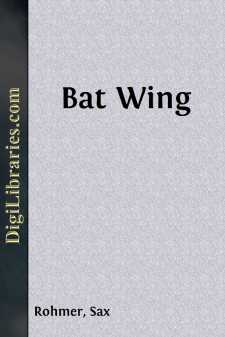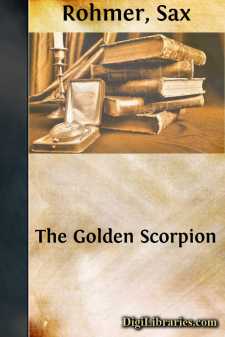Categories
- Antiques & Collectibles 13
- Architecture 36
- Art 48
- Bibles 22
- Biography & Autobiography 813
- Body, Mind & Spirit 142
- Business & Economics 28
- Children's Books 17
- Children's Fiction 14
- Computers 4
- Cooking 94
- Crafts & Hobbies 4
- Drama 346
- Education 46
- Family & Relationships 57
- Fiction 11829
- Games 19
- Gardening 17
- Health & Fitness 34
- History 1377
- House & Home 1
- Humor 147
- Juvenile Fiction 1873
- Juvenile Nonfiction 202
- Language Arts & Disciplines 88
- Law 16
- Literary Collections 686
- Literary Criticism 179
- Mathematics 13
- Medical 41
- Music 40
- Nature 179
- Non-Classifiable 1768
- Performing Arts 7
- Periodicals 1453
- Philosophy 64
- Photography 2
- Poetry 896
- Political Science 203
- Psychology 42
- Reference 154
- Religion 513
- Science 126
- Self-Help 84
- Social Science 81
- Sports & Recreation 34
- Study Aids 3
- Technology & Engineering 59
- Transportation 23
- Travel 463
- True Crime 29
The Orchard of Tears
by: Sax Rohmer
Description:
Excerpt
It was high noon of a perfect summer's day. Beneath green sun blinds, upon the terrace overlooking the lawns, Paul Mario, having finished his lunch, lay back against the cushions of a white deck-chair and studied the prospect. Sloping turf, rose-gay paths, and lichened brick steps, hollowed with age, zigzagging leisurely down to the fir avenue, carried the eye onward again to where the river wound its way through verdant banks toward the distant town.
A lark wooed the day with sweet music. Higher and ever higher rose the little sun-worshipper, pouring out his rapturous hymn to Apollo. Swallows, who but lately had crossed the battlefields of southern Europe, glided around Hatton Towers, describing mystic figures in the air, whilst the high feeble chirping of the younger generation sounded from the nests beneath the eaves. Amid the climbing roses bees were busy, their communal labours an object-lesson for self-seeking man; and almost at Mario's feet a company of ants swarmed over the yet writhing body of an unfortunate caterpillar, who had dropped from an apple-tree to fall a prey to that savage natural law of death to the weak. The harsh voice of a sentinel crow spoke from a neighbouring cornfield, and a cloud of dusky marauders took the air instantly, and before the sharp crack of the farmer's fowling-piece came to confirm the warning. In the hush of noon the tones of some haymakers at their patriarchal labours in a meadow beyond the stream were clearly audible—and the atmosphere constantly vibrated with remote booming of guns on the Western front.
Paul Mario was sufficiently distinguished in appearance to have been a person of no importance. His virile, curling black hair had the raven's-wing sheen betraying remote Italian forebears, and for that matter there was in his entire cast of countenance and the poise of his fine head something statuesquely Roman, Southern, exotic. His large but deep-set eyes were of so dark a blue as very generally to pass for "black"; and whilst in some moods they were soft and dreamy, in others, notably in moments of enthusiasm, they burnt darkly fierce in his pale olive face. In profile there was a certain resemblance to the Vatican head of Julius Caesar, save for the mouth, which had more gentle curves, and which was not unlike that of Dante; but seen full-face, and allowing for the fact that Paul Mario was clean-shaven, the likeness of feature to the traditional Christ was startling. This resemblance is equally notable in the face of Shakespeare.
Rather above medium height, well but slightly proportioned, the uneasy spirit of the man ever looking out of those arresting eyes so wholly dominated him as to create a false impression of fragility, of a casket too frail to confine the burning, eager soul within. His emotions were dynamic, and in his every mannerism there was distinction. The vein of femininity which is found in all creative artists betrayed itself in one item of Mario's attire: a white French knot, which slightly overlay the lapels of his well-worn Norfolk jacket.
To the world's caricaturists, when Paul Mario, at the age of twenty-six, had swept across the literary terrain, storming line after line, the white knot had proved a boon. Delilah, a lyrical drama, written in French, and first published in Paris, achieved for this darling of Minerva a reputation which no man is entitled to expect during his lifetime. Within twelve months of the date of publication it had appeared in almost every civilised language, and had been staged in New York, where it created a furore....












